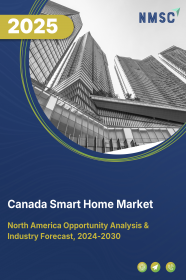
Canada Smart Home Market by Product Type (Smart Lighting, Smart Home Security & Surveillance, Smart Entertainment, and Smart Appliances), by Communication Protocol (Wi-Fi, Zigbee, Z-Wave, Bluetooth, and Thread), by Smart Home Hubs (Standalone Hubs and Built-in Hubs), by Voice Assistants Integration (Amazon Alexa, Google Assistant, Apple Siri, and Others) – Opportunity Analysis and Industry Forecast, 2024–2030
Industry: Retail and Consumer | Publish Date: 19-Mar-2025 | No of Pages: 232 | No. of Tables: 188 | No. of Figures: 133 | Format: PDF | Report Code : RC2266
US Tariff Impact on Canada Smart Home Market
Trump Tariffs Are Reshaping Global Business
Canada Smart Home Market Overview
The Canada Smart Home Market size was valued at USD 10.18 billion in 2023, and is predicted to reach USD 30.66 billion by 2030, at a CAGR of 17.1% from 2024 to 2030. A smart home, also known as a connected home, encompasses a residence equipped with advanced technology and automated systems designed to streamline the centralized control and monitoring of various household devices, appliances, and security features through a unified network.
These intelligent devices are capable of remote control and often respond to voice commands or pre-set schedules, offering homeowners increased convenience, energy efficiency, and security. Common elements found in connected homes include smart thermostats, lighting systems, security cameras, voice assistants, and other interconnected devices aimed at elevating the overall residential experience.
Increasing Demand for Cybersecurity Measures Boosts the Market Growth
The rising demand for smart home products in Canada is influenced by various factors, notably the increasing apprehension regarding cybersecurity incidents. With over 70% of Canadians encountering cybersecurity issues in 2022, up from 58% in 2020, there is a significant 12% year-on-year rise. This surge leads to Canadians to turn to connected home solutions to fortify their security measures and shield against cyber threats.
The inclination towards gaining better control and surveillance of interconnected devices, coupled with a strong emphasis on safeguarding personal data and privacy, serves as the driving force behind the adoption of connected home technologies. In an interconnected digital landscape, Canadians are increasingly seeking digital defenses through connected home solutions.
Focus on Energy Conservation and Sustainability Drives the Growth of the Market
Canada's increasing emphasis on energy conservation and sustainability contributes to the uptake of smart thermostats, lighting, and appliances. Consumers are actively seeking ways to reduce energy consumption and minimize their environmental impact. During this period, the adoption of internet-connected smart home devices witnessed a steady increase from 42% to 47%. This surge underscores Canadians' growing preference for automation and convenience in their quest for energy efficiency and environmental sustainability.
Security and Data Privacy Hinders the Market Growth
The smart home market encounters a significant obstacle in its growth trajectory due to concerns over the security of interconnected systems. Devices such as thermostats, cameras, and door locks are vulnerable to hacking, posing threats to residents' privacy and safety. This vulnerability often arises from weak passwords or inadequate Wi-Fi network security measures.
Exploiting these weaknesses, hackers gain unauthorized access, potentially compromising devices or accessing sensitive information. To address these risks, homeowners must prioritize strong password practices, regularly update device firmware, and fortify home networks to mitigate the threat of cyber-attacks and protect their connected homes from potential breaches.
Integration of Blockchain Technology into Smart Home Devices Presents Lucrative Opportunities for Market Expansion
Recognized for its robust security and transparent attributes, blockchain technology holds significant promise in strengthening the security and privacy of smart home systems. This is achieved through the encryption and secure storage of sensitive connected home data, empowering users to control access to their information and reducing the risk of unauthorized intrusion.
Blockchain validates device identities, ensuring that only trusted devices interact within the smart home network, and streamlines operations through tamper-resistant smart contracts. Moreover, it decentralizes device control, minimizing vulnerabilities and enabling transparent management of access control and permissions.
The incorporation of blockchain into connected homes not only enhances security and privacy but also creates a safer and more confidential environment. Consequently, it is poised to drive substantial growth opportunities within the Canada smart home market.
Competitive Landscape
Several market players operating in the Canada smart home industry include Schneider Electric, ABB Ltd, Amazon, Shelly, Samsung, LG Electronics, Sony Corporation, Somfy, Gomi Technologies, D-Link Systems, Inc., Emerson Electric Co., Microsoft Corporation, Google LLC, Robert Bosch Manufacturing Solutions GmbH, Ecobe.
Canada Smart Home Market Key Segments
By Product Type
-
Smart Lighting
-
Smart Bulbs
-
Smart Light Strips
-
Smart Switches
-
-
Smart Home Security and Surveillance
-
Smart Cameras
-
Video Doorbells
-
Smart Locks
-
Security System
-
-
Smart Entertainment
-
Smart TVs
-
Smart Speakers
-
Streaming Devices
-
-
Smart Appliances
-
Smart Refrigerators
-
Smart Ovens
-
Smart Washing Machines
-
Smart Dishwashers
-
Smart Home HVAC Management
-
Other Smart Appliances
-
By Communication Protocol
-
Wi-Fi
-
Zigbee
-
Z-wave
-
Bluetooth
-
Thread
By Smart Home Hubs
-
Standalone Hubs
-
Built-in Hubs
By Voice Assistants Integration
-
Amazon Alexa
-
Google Assistant
-
Apple Siri
-
Others
By Smart Home Compatibility with Smartphones
-
iOS
-
Android
By Installation
-
DIY Installation
-
Professional Installation
By Sales Channel
-
Online Retailers
-
E-commerce Platforms
-
Company Websites
-
-
Offline Retailers
-
Retail Stores
-
Supermarkets & Hypermarkets
-
Specialty Stores
-
KEY PLAYERS
-
Schneider Electric
-
ABB Ltd
-
Amazon
-
Shelly
-
Samsung
-
LG Electronics
-
Sony Corporation
-
Somfy
-
Gomi Technologies
-
D-Link Systems, Inc.
-
Emerson Electric Co.
-
Microsoft Corporation
-
Google LLC
-
Robert Bosch Manufacturing Solutions GmbH
-
Ecobee
REPORT SCOPE AND SEGMENTATION:
|
Parameters |
Details |
|
Market Size in 2023 |
USD 10.18 Billion |
|
Revenue Forecast in 2030 |
USD 30.66 Billion |
|
Growth Rate |
CAGR of 17.1% from 2024 to 2030 |
|
Analysis Period |
2023–2030 |
|
Base Year Considered |
2023 |
|
Forecast Period |
2024–2030 |
|
Market Size Estimation |
Billion (USD) |
|
Growth Factors |
|
|
Companies Profiled |
15 |
|
Market Share |
Available for 10 companies |
|
Customization Scope |
Free customization (equivalent up to 80 working hours of analysts) after purchase. Addition or alteration to country, regional, and segment scope. |
|
Pricing and Purchase Options |
Avail customized purchase options to meet your exact research needs. |

















 Speak to Our Analyst
Speak to Our Analyst




















